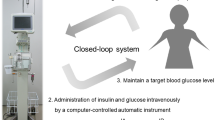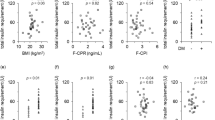Abstract
Cardiopulmonary bypass is known to cause alterations in insulin secretion and resistance, resulting in profound hyperglycemia. Aggressive treatment of the resulting hyperglycemia intra-operatively could result in a severe degree of post-operative hypoglycemia. We undertook this prospective non-randomized clinical study to compare the alterations in glucose homeostasis in diabetic (group A, n=50) and non-diabetic (Group B, n=50) patients undergoing moderate hypothermic (30°C) cardiopulmonary bypass for coronary artery bypass grafting (CABG). All patients had a fasting blood sugar level done on the morning of surgery. Blood sugars were monitored intra-operatively and post-operatively at fixed time intervals. Intra-operative hyperglycemia was treated aggressively by a continuous, infusion of injecting plain insulin. Both the groups experienced similar significant increase in blood glucose levels during bypass (‘p’=0.00003). However, the mean blood glucose level upon arrival in the intensive care unit was significantly decreased in group B compared to group A (p=0.0002). 60% of group B and 10% of group A patients required treatment for post-operative hypoglycemia (blood glucose level <60mg/dl). This clinical study reveals that attempting to maintain normoglycemia in this setting with Insulin may initiate post-operative hypoglycemia.
Similar content being viewed by others
References
Kuntschen, F.R., Galletti, P.M. and Hahn, C. (1986) Glucose-insulin interactions during cardiopulmonary bypass. J. Thoracic Cardiovascular Surgery, 91, 451–459.
Lanier, W.L. (1991) Glucose management during cardiopulmonary bypass: cardiovascular and neurologic implications. Anesthesia Analgesia, 72, 423–427.
Sieber, T.E. and Traystman, R.J. (1991) Special issues: Glucose and the brain. Critical Care Medicine, 20, 104–114.
Mets, S. (1995) Glucose priming solutions should be used for cardiopulmonary bypass. Journal of Cardiothoracic and Vascular Surgery, 9, 603–604.
Hindman, B. (1995) Glucose priming solutions should not be used for cardiopulmonary bypass. J. Thoracic Vascular Anesthesia, 9, 605–607.
Freerick, A.E., Johnston, W.E. and Jenkins, L.W. (1995) Hyperglycemia during hypothemic canine cardiopulmonary bypass increases cerebral lactate. Anesthesiology, 82, 512–520.
Metz, S. and Keats, A.S. (1991) Benefits of a glucose containing priming solution for cardiopulmonary bypass. Anesthesia Analgesia, 72, 428–434.
Nussmeier, N.A. and Fish, K.J. (1991) Neurophysiological dysfunction after cardiopulmonary bypass: A comparison of two institutions. J. Cardiothoracic Vascular Anesthesia, 5, 584–588.
Rossi, R., Van der Linden, J. and Ekroth, R. (1989) No flow or low flow? A study of the ischaemic marker creatine kinase BB after deep hypothermic procedures. J. Thoracic Cardiovascular Surgery, 98, 193–199.
Ekroth, R., Thompson, R.J. and Lincoln, C. (1989) Elective deep hypothermia with total circulatory arrest: changes in plasma creatine kinase BB; blood glucose and clinical variables. J. Thoracic Cardiovascular Surgery, 97, 30–35.
Mora, C.T., Henson, M.B. and Weintraub, W.S. (1996) The effect of temperature management during cardiopulmonary bypass on neurological and neuropsychological outcomes in patients undergoing coronary revascularization. J. Thoracic Cardiovascular Surgery, 112, 514–522.
Rogers, A., Stump, D. and Coker, L. (1997) Does insulin treatment improve neurobehavioral outcome following coronary artery bypass grafting? Anesthesiology, 87, 126.
Kuntschen, F.R., Galletti, P.M., Hahn, C., Arnulf, J.J., Isetta, C. and Dor, V. (1985) Alterations of insulin and glucose metabolism during cardiopulmonary bypass. J. Thoracic Cardiovascular Surgery, 89, 97–106.
Curry, D.L. and Curry, K.P. (1970) Hypothermia and insulin secretion. Endocrinology, 87, 750–755.
Baum, D., Dillard, D.H. and Porte, D. (1968). Inhibition of insulin release in infants undergoing deep hypothermic cardiovascular surgery. N. Engl. J. Med. 279, 1309–1314.
Moffitt, E.A., Rosevear J.W., Molnar, G.D. and Mc Goon, D.C. (1970) Myocardial metabolism in open heart surgery. J. Thoracic Cardiovascular Surgery 59, 691–706.
Devlin, T.M. (1997), Textbook of Biochemistry and Clinical Correlations 4th edition. A. John Wiley and Sons Inc., New York, USA. Pg. 299–300
Gill, G.V. Sherif, I.F. and Alberti, K.G.M.M. (1981) Management of diabetes during openheart surgery. Br. J. Surg. 68, 171–172.
Author information
Authors and Affiliations
Rights and permissions
About this article
Cite this article
Sanjay, O.P., Prashanth, P. & Tauro, D.I. Attempting to maintain normoglycemia during cardiopulmonary bypass with insulin may initiate post-operative hypoglycemia. Indian J Clin Biochem 18, 119–126 (2003). https://doi.org/10.1007/BF02867377
Issue Date:
DOI: https://doi.org/10.1007/BF02867377




